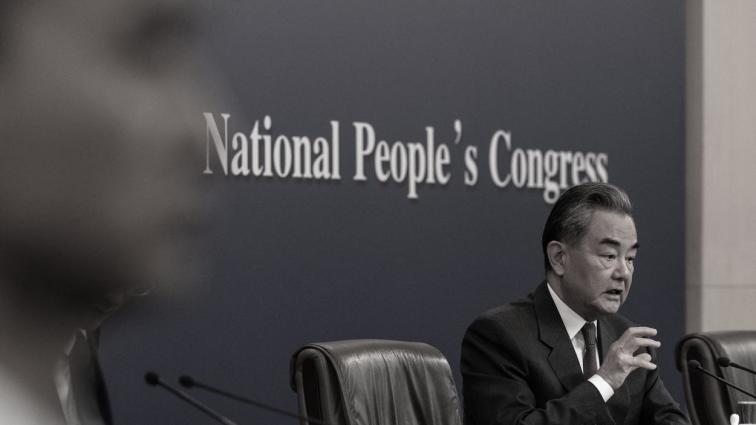On March 5, 2023, Chinese Premier Li Keqiang (right) walked past Chinese President Xi Jinping after delivering the government work report during the opening session of the National People's Congress (NPC) at the Great Hall of the People in Beijing. (Photo by Noel Celis/AFP via Getty Images)
[People News] According to disclosures from overseas People's Daily, the publication recently received a tip from a mysterious individual signing as 'Nothing Much to Say', who provided a comprehensive account of the murder of former Chinese Premier Li Keqiang. This individual claimed that, under the direction of superiors, they participated in a six-member team assigned to carry out a mission codenamed '23107'.
The team allegedly used a heart disruptor agent known as 'Cardio-Disruptor', which was placed in the water that Li Keqiang consumed before swimming, resulting in 'irreversible cardiac pathology', specifically symptoms of 'sudden myocardial infarction'. When Li Keqiang experienced a heart attack, they performed what they termed simulated first aid and transported him to the Pudong branch of Shuguang Hospital for emergency treatment, but he ultimately succumbed to his condition. The informant also indicated that the Pudong branch had been pre-selected for this purpose.
This disclosure provides the most detailed account available regarding the circumstances surrounding Li Keqiang's death. While the authenticity of the claims cannot be verified, the overall logic and the symptoms associated with Li Keqiang's death appear to align closely.
In fact, as early as October 2023, following the sudden death of Li Keqiang, rumours began circulating online suggesting that he had been poisoned. Former mainland media figure Zhao Lanjian reported that, according to his sources, Li Keqiang actually died on October 26, not the 27th, and had already passed away before arriving at Shuguang Hospital; he was poisoned. After his death, the six members of the Politburo Standing Committee of the Communist Party of China spent 18 hours crafting a political narrative for Li. The conclusion was that domestic media would continue to report in colour rather than switching to black and white. The poisoning was allegedly carried out by the Shanghai Armed Police under the orders of their commander, Chen Yuandong, who is a fellow townsman of He Weidong, the current Vice Chairman of the Central Military Commission.
In addition to Zhao Lanjian's claims, there are three other related allegations from overseas. One report suggests that the security at the Dongjiao Hotel in Shanghai, where Li Keqiang was staying, was managed by the Central Special Police Bureau, and that the bureau's head, Minister of Public Security Wang Xiaohong, ordered the poisoning of Li Keqiang.
Another report indicates that as early as a month prior, Cai Qi, a member of the Politburo Standing Committee and Secretary of the Secretariat, had ordered the preparation of Li Keqiang's suicide note. This appears to align with earlier state media reports that tested public reaction to news of Li Keqiang's death.
All three allegations point to the highest levels behind He Weidong, Wang Xiaohong, and Cai Qi, while another claim suggests that the Jiang-Zeng faction was responsible for the poisoning of Li Keqiang, intending to frame Xi Jinping for the act.
However, regardless of the source of the leaks, they all share a common theme: Li Keqiang's death is shrouded in ambiguity, and there is a strong belief that he was murdered, with poisoning being the most likely cause. Additionally, both medical professionals and nurses who have provided long-term care to high-ranking officials of the Communist Party of China have confirmed that it is nearly impossible for Li Keqiang to have died from heart disease. This suggests that the likelihood of his death being unnatural is significantly higher than that of it being natural. The recent revelations regarding the conspiracy to harm Li Keqiang appear to be filling in previously unknown gaps.
So, why has the full account of Li Keqiang's alleged murder surfaced at this particular moment? If these claims are true, what message is being communicated to the outside world?
The author posits that this primarily serves to confirm the reality of Xi Jinping's loss of power. If Xi were still in control, the leakers would likely be more concerned about their own safety.
Furthermore, this indicates that following Xi's loss of power, high-ranking officials who once supported him are now facing their own challenges. Among the three individuals implicated in the leaks, He Weidong has been missing for over three months, with his fate still unknown; while Cai Qi and Wang Xiaohong remain in their positions, their actions are evidently constrained. It is uncertain whether they will face investigations in the future, and those who executed their orders may also sense impending danger, fearing they could be discarded after their usefulness has ended. Thus, it is plausible that they might choose to expose the inner workings in advance. Whether this is a move for self-preservation or a scenario of mutual destruction remains to be seen.
Lastly, the leaks indicate that the murder case involving Li Keqiang encompasses personnel from various entities, including the Ministry of State Security, the Ministry of Public Security, the Publicity Department, the Shanghai Municipal Public Security Bureau, and hospitals. This suggests that the orders must originate from the highest echelons; otherwise, other high-ranking officials would not dare to issue such a murder directive. Is this an effort to lay the groundwork for revealing the truth behind Li Keqiang's death in the future and holding those responsible accountable?
In conclusion, these revelations are likely to be complex, and they could potentially impact the political landscape of the Chinese Communist Party. Indeed, if such information becomes widely known among the Chinese populace, the public sentiment that already shows sympathy for Li Keqiang could evolve in ways that Zhongnanhai may find difficult to manage. △
(First published by the People News)









News magazine bootstrap themes!
I like this themes, fast loading and look profesional
Thank you Carlos!
You're welcome!
Please support me with give positive rating!
Yes Sure!